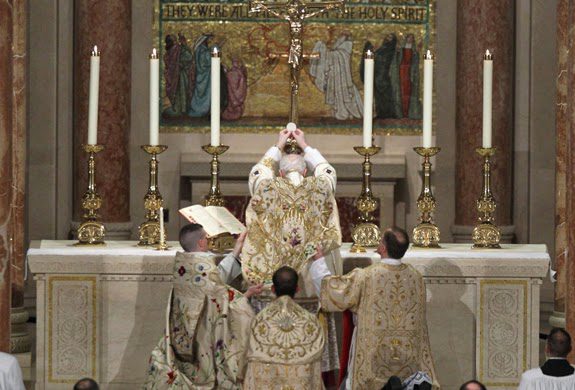Do you want to be a saint?
Do you think its something that is beyond your
grasp?
grasp?
Something that only the perfect — those who do
amazing fasts and penances — or only those who died heroically for Christ can
achieve?
amazing fasts and penances — or only those who died heroically for Christ can
achieve?
If this is your idea of sainthood — very few of us
could pass the test.
could pass the test.
But, providentially, holiness doesn’t consist in
perfect behavior and it doesn’t necessarily include extreme penances or heroic bodily
martyrdom. … Holiness, instead, is at its essence — a response to LOVE.
perfect behavior and it doesn’t necessarily include extreme penances or heroic bodily
martyrdom. … Holiness, instead, is at its essence — a response to LOVE.
Not any love, but LOVE, which is the most apt
description of God that can be expressed in human language. It is the
core of Who God IS; Who He is in His very nature.
description of God that can be expressed in human language. It is the
core of Who God IS; Who He is in His very nature.
Because God is LOVE, he cannot not love.
To not love goes against His very self —
against His very core, His Being.
against His very core, His Being.

To be holy, then, is to recognize and receive this
LOVE that God has for us. The Father showed us the depth of His Love for us
when He sent us His Only Begotten Son, Jesus, (a name that literally means
God saves!) to redeem us by offering His Life for US — for our
salvation! (cf. Jn 3:16).
LOVE that God has for us. The Father showed us the depth of His Love for us
when He sent us His Only Begotten Son, Jesus, (a name that literally means
God saves!) to redeem us by offering His Life for US — for our
salvation! (cf. Jn 3:16).
Jesus is the Revelation — the revealing — of His
Father’s LOVE for us!
Father’s LOVE for us!
It is the greatest revelation that Jesus shared
with us. His whole life is a revealing of this LOVE — a manifestation —
a making present — of what we could have never known on our own.
with us. His whole life is a revealing of this LOVE — a manifestation —
a making present — of what we could have never known on our own.
Jesus’ INCARNATION – His becoming flesh — His taking on our body as His own — is
a sign of the immense dignity we have as human beings and the great heights
that God has in mind for us! For “God
became man, so that we can become god” (St. Athanasius). This quote
expresses the fact that God took our human nature when He became man, in order
to raise it up and transform it by uniting it to His Divine Life. He died to
free us from sin and death that kept us separated from Him, so that we could “live with Him, in Him and through Him in
unity with the Holy Spirit”(cf. the concluding part of the Eucharistic Prayer, called the Per Ipsum). He has no
favorites. He came to save all mankind — loving each of us completely
and uniquely; and desiring each of us to receive
His love and allow its Beauty, Grace and Truth to transform our lives.
a sign of the immense dignity we have as human beings and the great heights
that God has in mind for us! For “God
became man, so that we can become god” (St. Athanasius). This quote
expresses the fact that God took our human nature when He became man, in order
to raise it up and transform it by uniting it to His Divine Life. He died to
free us from sin and death that kept us separated from Him, so that we could “live with Him, in Him and through Him in
unity with the Holy Spirit”(cf. the concluding part of the Eucharistic Prayer, called the Per Ipsum). He has no
favorites. He came to save all mankind — loving each of us completely
and uniquely; and desiring each of us to receive
His love and allow its Beauty, Grace and Truth to transform our lives.
This is what being a saint is — it is living in love with our God who created, redeemed, knows and
loves us — even to counting every hair on our head and every beat of our heart
– to the very depth of our being (cf. Ps
139). A saint is only a saint, therefore, in and through their relationship
with God. No matter where we come from, no matter what we’ve done, if we accept the unfathomable Love that God
has for us and respond with love in
return, we are living in union with God and thus living in holiness. We
think of saints as being only in heaven, but saints also are alive on earth. That’s
why the Church urges us on and reminds us that we are called to be saints.
loves us — even to counting every hair on our head and every beat of our heart
– to the very depth of our being (cf. Ps
139). A saint is only a saint, therefore, in and through their relationship
with God. No matter where we come from, no matter what we’ve done, if we accept the unfathomable Love that God
has for us and respond with love in
return, we are living in union with God and thus living in holiness. We
think of saints as being only in heaven, but saints also are alive on earth. That’s
why the Church urges us on and reminds us that we are called to be saints.
 All those in love long to be close to those they
All those in love long to be close to those theylove. Similarly, our love of God inspires
a longing in us to be close to Him, to communicate with Him. This communication
is called prayer. Therefore, if we love
God, we don’t pray to fulfill an obligation, to “get it over with,” to keep us
from hell or engage in it mindlessly or superstitiously. If we understand that prayer is communicating
with the Lover of our souls, we come to realize that we can share with Him our
deepest joys, sufferings, fears and failures, recognizing that He did not come to judge but to save and to
love us (cf. Jn 3:17). The more we
come to know Him, the more we that He alone understands us completely, loves us
infinitely and unconditionally, and fulfills the deepest longings in our
hearts. Our understanding and love of
God is deepened and grows through our relationship with Him, one that is nourished
especially through the Mass, our greatest prayer. Although our understanding deepens, it is in
this understanding that we recognize that we can never fully“comprehend the breadth, the length, the
height and depth of the fullness of the Love and Mercy of God” (cf. Eph 3:18), but
we do experience a taste of His Presence, which is joy, peace and grace
even in the midst of circumstances filled with sorrow and pain.
 Thus, prayer is talking to God, and listening to
Thus, prayer is talking to God, and listening toHim. Perhaps you are someone who struggles to hear God. “That may be fine for other people, but I can’t
discern His voice,” you may insist. I have, however, one sure-fire way to
hear His voice! It is to read the Sacred Scriptures. The Bible not only shares the
story of God and the immeasurable love He has for us; but, if we pray with and
in the Scriptures, we can assured of hearing His voice, for the Bible is truly
the Word of God – it is “living and
effective” (Heb 4:12) and inspired by the Holy Spirit. You may say, “But I don’t hear his voice when
I read Scripture!” This is where our persistence in love and our virtue comes
in; because much of the time, whether in Mass or when we pray with the
Scriptures, we must remain rooted in love in order to hear the “still, small voice” of God (1 Kings 19:12) amidst
the noise and busyness of our lives often drown out His whisper. If we persist in love — then, we, too, like
Jeremiah, can say, “When I found your
words, I devoured them; your words were my joy, the happiness of my heart” (Jer
15: 16).
It is our love of God (charity) that spurs us on to be
patient, diligent and humble enough to persist in seeking Him, to persist in attending
Mass and reading and rereading the Sacred texts asking the Holy Spirit to come
alive in our understanding of Jesus and in what He is saying to us. It is our love of God that is rooted in these
virtues that enables us to wait upon Him, and to seek His Face even in silence
and painful circumstances — even when we experience dryness and there is no
consolation. This is where Love comes in, because Love enables us to persevere
in loving a person for who he is and not for what he can do for us. We do not
pray in order to gain consolations and graces, but in order to grow in love and
closeness to God. That is why Love is the means, the key and the goal of all we
do. We will go nowhere in our spiritual lives if we only “love” a set of rules,
or even the truth of our religion… the only way we will progress in holiness
and in prayer is because we love a Person – Jesus Christ – Who lives and reigns
within the Trinity of three Divine Persons: Father, Son and Holy Spirit, Whom He
revealed to us by “pouring out His spirit
in us, which cries out, ‘Abba, Father!’” (cf. 1 Jn 4: 19; Gal 4:6 emphasis mine).
patient, diligent and humble enough to persist in seeking Him, to persist in attending
Mass and reading and rereading the Sacred texts asking the Holy Spirit to come
alive in our understanding of Jesus and in what He is saying to us. It is our love of God that is rooted in these
virtues that enables us to wait upon Him, and to seek His Face even in silence
and painful circumstances — even when we experience dryness and there is no
consolation. This is where Love comes in, because Love enables us to persevere
in loving a person for who he is and not for what he can do for us. We do not
pray in order to gain consolations and graces, but in order to grow in love and
closeness to God. That is why Love is the means, the key and the goal of all we
do. We will go nowhere in our spiritual lives if we only “love” a set of rules,
or even the truth of our religion… the only way we will progress in holiness
and in prayer is because we love a Person – Jesus Christ – Who lives and reigns
within the Trinity of three Divine Persons: Father, Son and Holy Spirit, Whom He
revealed to us by “pouring out His spirit
in us, which cries out, ‘Abba, Father!’” (cf. 1 Jn 4: 19; Gal 4:6 emphasis mine).
Everything hinges, then, on LOVE –the first and the
most vital virtue.
most vital virtue.
If we have LOVE, then we long to give ourselves in love. We long to give all of ourselves –our
hearts, minds, bodies and spirits as pure offerings to God as they were first intended
to be at our creation (this is the virtue of chastity) in order to see, recognize
and respond to His Beauty, Goodness and Truth amid the clamoring and blaring
voices that push us toward false and superficial counterfeits of His Real LOVE.
hearts, minds, bodies and spirits as pure offerings to God as they were first intended
to be at our creation (this is the virtue of chastity) in order to see, recognize
and respond to His Beauty, Goodness and Truth amid the clamoring and blaring
voices that push us toward false and superficial counterfeits of His Real LOVE.
We must practice kindness with ourselves and be
patient, diligent and humble with our frailty and our faulted, sinful human
nature so that we never tire of beginning again. So that we never tire of
striving for union, or of confessing our sins in order to live in closeness to
God, who is always willing to forgive us.
patient, diligent and humble with our frailty and our faulted, sinful human
nature so that we never tire of beginning again. So that we never tire of
striving for union, or of confessing our sins in order to live in closeness to
God, who is always willing to forgive us.
 No one can live a sinless life — we must be humble
No one can live a sinless life — we must be humblewith ourselves (and others) — not only in accepting this fact, but also in
clinging to who we are in Christ – recognizing that we are members of His Body
and temples of the Holy Spirit by virtue of our baptisms. Humility isn’t thinking less of ourselves –
it is thinking the Truth of ourselves – which is to recognize that although we
are faulted, we remain God’s beloved sons and daughters who have an everlasting
inheritance awaiting us if we respond in love to God.
Responding to this LOVE finds its roots in prayer and
is expressed in action. Both prayer and
action are means of growing closer to and becoming more like our Beloved
Savior. And as expressed in our reflections on prayer, our actions, likewise, are
steeped in struggle and frailty; and therefore, can only be pursued by
persisting in the virtues named above.
These virtuous habits enable us to persevere when our feelings of love
fade. They carry us beyond our feelings
into true sacrificial love – which leads us closer to God, strengthens our
union with Him, and enables us to become more like Him.
is expressed in action. Both prayer and
action are means of growing closer to and becoming more like our Beloved
Savior. And as expressed in our reflections on prayer, our actions, likewise, are
steeped in struggle and frailty; and therefore, can only be pursued by
persisting in the virtues named above.
These virtuous habits enable us to persevere when our feelings of love
fade. They carry us beyond our feelings
into true sacrificial love – which leads us closer to God, strengthens our
union with Him, and enables us to become more like Him.

Jean Heimann’s wonderful new book, Seven Saints for Seven Virtues, holds up these virtues,
and shares true stories of people who recognized and responded to God’s love by entering deeply into communion with Him in
and through prayer. True prayer leads us to share in Jesus’ Divine Life, which overflows out of our union with God into an abundant life of love and fruitfulness. To illustrate
this, Heimann showcases two different kinds of saints: one that is recognized by the Church, and one that is unrecognized. Both of whom lived (or are living) lives rooted in virtue and exemplify this overflowing of grace that comes from communion with God. In
particular, Heimann writes about seven saints and seven virtues for us to emulate. They include:
and shares true stories of people who recognized and responded to God’s love by entering deeply into communion with Him in
and through prayer. True prayer leads us to share in Jesus’ Divine Life, which overflows out of our union with God into an abundant life of love and fruitfulness. To illustrate
this, Heimann showcases two different kinds of saints: one that is recognized by the Church, and one that is unrecognized. Both of whom lived (or are living) lives rooted in virtue and exemplify this overflowing of grace that comes from communion with God. In
particular, Heimann writes about seven saints and seven virtues for us to emulate. They include:
Mother Teresa of Calcutta: Model of Charity
St. Agnes: Model of Chastity
St. John Paul II: Model of Diligence
St. Joseph: Model of Humility
St. Catherine of Siena: Model of Kindness
St. Monica: Model of Patience
St. Augustine: Model of Temperance
Interesting and profound anecdotes can be found frequently within the pages of this beautiful book, serving as practical examples of holy men and women living these virtues. It was these stories that especially touched
my heart. Reading stories of virtue can inspire us to continue striving for this union with God that is expressed so uniquely in each of the ordinary lives that Heimann shares with us in her book. To put the premise of the book in my own
words, would be to say that this book was written to demonstrate that ordinary people
can become extraordinary through accepting and embracing God’s love so
deeply and interiorly, that they can say with St. Paul: “I
no longer live, but Christ lives in me” (Gal 2: 20).
my heart. Reading stories of virtue can inspire us to continue striving for this union with God that is expressed so uniquely in each of the ordinary lives that Heimann shares with us in her book. To put the premise of the book in my own
words, would be to say that this book was written to demonstrate that ordinary people
can become extraordinary through accepting and embracing God’s love so
deeply and interiorly, that they can say with St. Paul: “I
no longer live, but Christ lives in me” (Gal 2: 20).
I shared
previously in another post, the story that touched me most deeply. But, to highlight
other gems in this book, I will share two insights which were shared from Mother
Teresa’s writings. These beautifully highlight that her love was something that went far beyond any
feeling of consolation. Rather, her love
for God (and for others in Him) was one deeply rooted in Christ’s love and was a response to this love. Her
holiness, therefore, came from her continual choice to love, seek, accept and
live rooted in this communion of LOVE, (which all of us are called to, for God
shows no partiality).

This first passage comes from Mother Teresa’s diary. It expresses the pain and struggle that accompanied
the early years of founding her new order, and perfectly exemplifies the
practice of virtues in her love of Christ:
the early years of founding her new order, and perfectly exemplifies the
practice of virtues in her love of Christ:
“Today I learned a good lesson. They poverty of the poor must be so hard for
them. While looking for a home I walked and walked till my arms and legs
ached. I thought how much they must ache
in body and soul, looking for a home, food and health. Then the comfort of Loreto [her former order]
came to tempt me. ‘You have only to say the word and all that will be yours again,’
the Tempter kept on saying… Of free choice, my God, and out of love for you,
I desire to remain and do whatever be your Holy will in my regard. I did not let a single tear come.”
them. While looking for a home I walked and walked till my arms and legs
ached. I thought how much they must ache
in body and soul, looking for a home, food and health. Then the comfort of Loreto [her former order]
came to tempt me. ‘You have only to say the word and all that will be yours again,’
the Tempter kept on saying… Of free choice, my God, and out of love for you,
I desire to remain and do whatever be your Holy will in my regard. I did not let a single tear come.”
Another passage from Mother Teresa’s writings
express that our ultimate means of achieving communion with God is through the Eucharist:
express that our ultimate means of achieving communion with God is through the Eucharist:

“Where will you get the joy of loving? — in the Eucharist, Holy Communion. Jesus has made Himself the Bread of Life to
give us life. Night and day, he is
there. If you really want to grow in
love, come back to the Eucharist, come back to that adoration….
give us life. Night and day, he is
there. If you really want to grow in
love, come back to the Eucharist, come back to that adoration….
See Him in the tabernacle; fix your eyes on him who
is the light; bring your hearts close to His Divine Heart; ask Him to grant you
the grace of knowing Him, the love of loving Him, the courage to serve
Him. Seek Him fervently.”
is the light; bring your hearts close to His Divine Heart; ask Him to grant you
the grace of knowing Him, the love of loving Him, the courage to serve
Him. Seek Him fervently.”
To summarize, Jean Heimann writes beautifully about
the virtues and about those who exemplified the virtues in their lives. Sharing with her readers that those who have
journeyed before us were not superhuman “plaster paris” saints, but real human
beings like us, who did great things because they accepted and responded to
God’s love concretely and devotedly — choosing to stay close to Him in prayer
and the Sacraments amid trials, struggles and dryness. This love they manifest is, first of all, a
grace of God; but their response (and ours) to this grace is practically worked
out in our lives by living lives filled with the virtues of charity, chastity, diligence,
humility, kindness, patience and temperance, which we gain through cooperating with the Holy
Spirit at work in our lives. (Thankfully, we can never do anything truly on our own!)
the virtues and about those who exemplified the virtues in their lives. Sharing with her readers that those who have
journeyed before us were not superhuman “plaster paris” saints, but real human
beings like us, who did great things because they accepted and responded to
God’s love concretely and devotedly — choosing to stay close to Him in prayer
and the Sacraments amid trials, struggles and dryness. This love they manifest is, first of all, a
grace of God; but their response (and ours) to this grace is practically worked
out in our lives by living lives filled with the virtues of charity, chastity, diligence,
humility, kindness, patience and temperance, which we gain through cooperating with the Holy
Spirit at work in our lives. (Thankfully, we can never do anything truly on our own!)
So, if you are interested in growing in virtue and
enjoy hearing stories of holiness shining forth in concrete, day-to-day
circumstances of life, I believe you’ll greatly enjoy and be inspired by this
wonderful book.
enjoy hearing stories of holiness shining forth in concrete, day-to-day
circumstances of life, I believe you’ll greatly enjoy and be inspired by this
wonderful book.
And as an added bonus, Servant Books has graciously offered 2 FREE COPIES of this book for
me to give away to my readers. If you
are interested in receiving one of these copies, please send your complete name
and mailing address to my email. The contest will end on 10-29-2014. The winners will be awarded this inspirational book free of
charge.
me to give away to my readers. If you
are interested in receiving one of these copies, please send your complete name
and mailing address to my email. The contest will end on 10-29-2014. The winners will be awarded this inspirational book free of
charge.
Good Luck!
Copyright Janet Moore 10-22-14